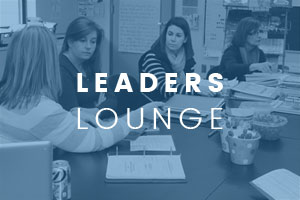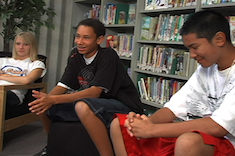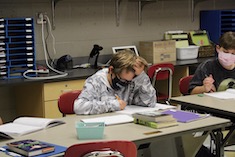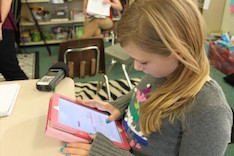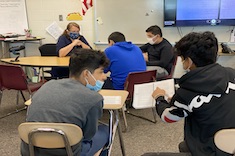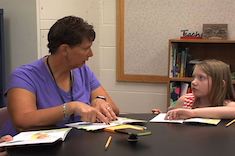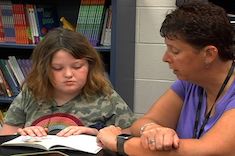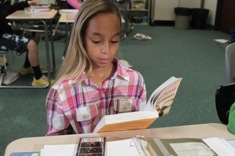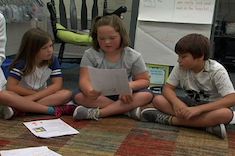The Lead Learners
The Lead Learners is a professional learning network in northern Indiana to encourage instructional leadership and literacy practices. The Lead Learners exists to help educators stay sharp and engage learners.
All Content
Bridging the Gap (Session 1): The Sold a Story Peel
Mary Brower shares a professional learning experience that peels back the layers of the Sold a Story podcast to help teachers find common ground in reading instruction. Includes a template for a guided conversation.
Empowering Teachers and Building Relationships
As a traveling coach, Mary Brower was overwhelmed by the amount of things she was. One day when the load felt too big, she heard joy spilling out of a classroom. Stopping to look into the classroom led to a powerful connection with a teacher…and a realization about what a coach really needs to carry.
Building Teacher Confidence, Building Leaders: The Power of Observation
Paula Fiscus questions how to uplift more teacher leaders, and decides peer observations may be the catalyst to teachers believing they can grow and lead. Paula offers procedures, forms, and the encouragement needed to set peer observations in motion in your school
Making Learning Visible from Coaching Cycles
Jonathan Winslow offers three practical ways to share teacher learning during a coaching cycle with the entire school or district. His suggestions are excellent ways to uplift teacher voices and inspire one another.
Coaching Minute: Ask for Help
Curriculum director Inga Omondi advises the best thing for leaders to do is ask for help.
Coaching Minute: Keep a Meeting Journal
Curriculum director Inga Omondi spends a lot of time in meetings. To make connections, remember next steps, and stay organized, she keeps a journal with all of her meeting notes.
Coaching Minute: Tough Meetings
Curriculum director Inga Omondi understands the tension that can build in meetings. She offers advice for instructional coaches on what to do after a tough meeting.
Assessing High School Readers
Secondary instructional coach Holly Wenning shares ways to assess high school readers.
Teaching Readers Rather Than Teaching Books
Secondary instructional coach Holly Wenning shares her own paradigm shift of teaching readers rather than teaching books, and encourages all teachers to consider the importance of putting students before books when planning literacy instruction.
Coaching Minute: Change Can Be Rewarding
Instructional coach Paula Fiscus shares the notion that change is a catalyst for growth. Although change can be difficult and challenging, it is also rewarding.
Expanding the Definition of “Text”
Holly Wenning helps us expand the definition of text when considering mentor texts and reading assessments.
The Importance of the Workshop Model in High School
Instructional coach Holly Wenning shares the importance of the workshop model, and especially work time, for high school students. See the transition from minilesson to work time in a 10th-grade English class.
Coaching Minute: The Risk of Vulnerability
Instructional coach Jenn Ross explains the importance of being vulnerable. By modeling the expectations for phonics minilessons, she risked failure in front of her colleagues and was reminded of a powerful way to build strong relationships.
Coaching Minute: Encouraging Teacher Leaders
Instructional coach Jonathan Winslow shares how he intentionally creates leadership opportunities for the teachers he works alongside.
Coaching Minute: Keep the Focus on Students
Inga Omondi suggests keeping the focus on students in order to entice apprehensive teachers into a coaching relationship.
Coaching Minute: Navigating Tough Conversations
Instructional coach Holly Wenning shares advice for navigating tough conversations.
Coaching Minute: The Gift of Time
Instructional coach Mary Brower shares an idea to give the gift of time to teachers.
Coaching Minute: The Importance of Patience
Instructional coach Mary Brower reminds us of the importance of patience, especially with ourselves.
Coaching Minute: Invitations for Secondary Teachers
Instructional coach Holly Wenning shares ways to invite secondary teachers to work alongside a coach.
Coaching Minute: Taking Risks
Instructional coach Mary Brower encourages us to notice leaders and teachers who are taking risks. Couple a quick note with an inspirational story, and you will build strong professional connections needed for meaningful leadership. Download a copy of the inspirational story.
Coaching Minute: Supporting a Principal’s Vision
Holly Wenning attests to the importance of instructional coaches knowing and supporting a principal’s vision.
Minilesson: Using a Web Search to Help Visualize
Staci Revere helps her middle school multilanguage students learn to visualize by discovering images through a web search to understand the text in a deeper way.
Guided Reading Part 3: Closure
This is the first guided reading group in September for Cheryl Miller. She concludes the lesson by having students share their understanding of the text and reviewing skills that were practiced. This is the final video in a three-part series.
Guided Reading Part 2: Whisper Reading and Instruction
This is the first guided reading group in September for Cheryl Miller. She continues the lesson by listening to the students whisper read and instructing them as needs arise. This is the second video in a three-part series.
Quick Take: Share Your Reading Struggles
Instructional coach Staci Revere reminds us of the importance of modeling our own reading lives for students, especially the parts where we struggle as readers.
Coaching Minute: Find a Network of Coaches
Inga Omondi encourages instructional coaches to curate a network of others who are doing similar work.
Encouraging Instructional Confidence
Angela Miller highlights ways to encourage, equip, and empower instructional confidence in teachers.
Coaching Minute: Listen Deeply
Instructional coach Staci Revere shares a key mantra to use when working with teachers, especially those who do not want to work with an instructional coach.
Have a Little Fun and Encourage Colleagues
Inga Omondi offers wise (and fun) advice on how to uplift and encourage colleagues.
Tracking Thinking: Fifth-Grade Small Group
Julianne Houser meets with a small group of fifth graders to help them build skills for tracking thinking.
Guided Reading in a First-Grade Group
Melissa Atwood leads a first-grade guided reading group. This is the second video in a two-part series.
Guided Reading in First Grade: Blends
Melissa Atwood leads a first-grade guided reading group. The focus at the start of the lesson is on blends in words. This is the first video in a two-part series.
Socratic Discussion in Third Grade
Lora Bieghler facilitates a Socratic-style discussion among third graders.
First Grade Minilesson: Connections
Melissa Atwood leads her first-grade class with a minilesson early in the school year on making connections to text.
Coaching Minute: Sharing Individual Learning with Teaching Teams
Jean Russell explains how she leverages one-on-one coaching for learning with entire grade-level teams.
First-Grade Guided Group: Reading Practice and Recap
Melissa Atwood leads a first-grade guided reading group. This is the second video in a two-part series.
Special Education and Classroom Teacher Meeting
Special education teacher Julianne Houser and fourth-grade teacher Heidi discuss how they can work together to support specific students.
First Graded Guided Group: Chunking Words
Melissa Atwood leads a first-grade guided reading group. The focus at the start of the lesson is on chunking words. This is the first video in a two-part series.
Coaching Minute: Leveraging a Calendar for Leadership
Jean Russell explains how a simple trick with a coaching calendar can build in more time and expectations for leadership growth.
Coaching Minute: 3/3/3 PD
How can you be sure texts used in professional development become anchors for learning beyond the moment they are read? Jean Russell recommends the 3/3/3 method for reading and reflection with colleagues as a quick way to make the learning stick.
Coaching Minute: Using Quotes to Read the Room
Literacy coach Jean Russell explains how she uses quotes at the start of a professional development session to read the room and launch conversations about a topic.
Coaching Minute: Using Quotes to Explore Beliefs
Jean Russell shares how literacy coaches can use quotes in professional development sessions to explore teachers’ beliefs and identities.
Introducing Onomatopoeia Minilesson
Christi Overman teaches her second graders about onomatopoeia in a brief minilesson.
Bridging the Gap (Session 2): Finding Your Footing
Mary Brower provides a second professional learning session to help ease the tension between teachers who have opposing views about literacy instruction. Mary provides a protocol for creating a school-wide document of foundational literacy beliefs.
Coaching Minute: Six-Week Coaching Cycle
Jean Russell explains the expectations for a six-week coaching cycle.
Coaching Minute: Wearing (Too) Many Hats
Inga Omondi encourages instructional coaches to consider the many hats they wear and to remove the ones that are not serving the greater good.
Coaching Minute: Clarifying a Vision
Inga Omondi encourages asking questions during meetings to determine how a vision needs to be clarified.
Coaching Minute: The Power of Video Debriefs
Jean Russell explains why she captures her coaching debriefs with teachers, and how these videos serve as powerful tools for learning.

